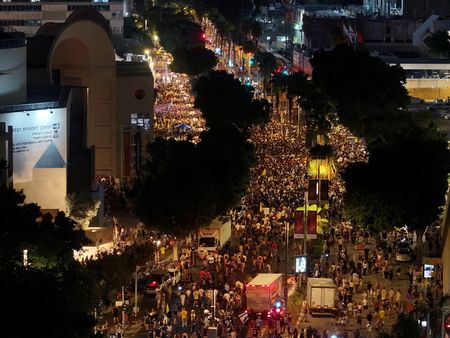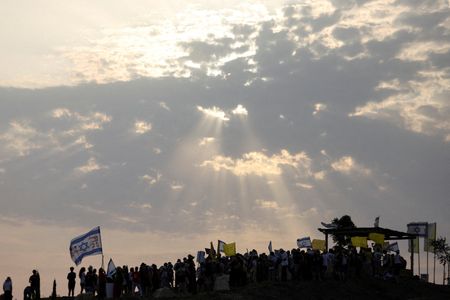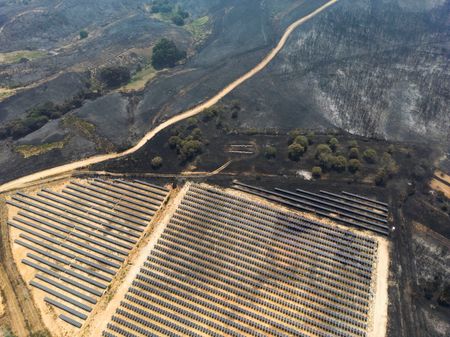By Emily Rose
JERUSALEM (Reuters) -As Israel seeks to expand its offensive in Gaza, a measure of how the country’s mood has changed in the nearly two-year-old conflict is the discontent evident among some reservists being called up to serve once again.
Shortly after the October 7, 2023 attack on southern Israel by Palestinian militant group Hamas, Israelis dropped everything — honeymoons, studies and new lives abroad — to rush home and fight.
Now, some voice disillusionment with political leaders sending them back into battle, as the military prepares to take control of Gaza City, the enclave’s biggest urban centre.
According to a study conducted by Agam Labs at the Hebrew University which measured sentiment about the new campaign among more than 300 people serving in the current war, 25.7% of reservists said their motivation had decreased significantly compared with the start of the campaign.
Another 10% said their motivation slightly decreased.
Asked to describe their feelings about the campaign, the biggest group — 47% — of responders expressed negative emotions towards the government and its handling of the war and hostage negotiations.
In March, before the latest offensive was announced, the Israeli news outlet Ynet reported that the amount of reservists reporting for duty was 30 percent below the number requested by military commanders.
Prime Minister Benjamin Netanyahu vowed to destroy Hamas after it attacked Israel in Oct. 7, 2023 in the bloodiest single day for Jews since the Holocaust, killing 1,200 people and taking 251 hostages to Gaza, according to Israeli tallies.
But the war has dragged on, with Hamas still putting up a fight and Israelis condemning their prime minister for failing to reach a deal with the militant group to win the release of hostages despite many mediation efforts.
‘THIS WAR IS ENTIRELY POLITICAL’
Reservists were among thousands of Israelis who took part in a nationwide strike on Sunday, one of the biggest protests in support of families of hostages, calling on Netanyahu to reach an agreement with Hamas to end the war and release the remaining captives.
One of those angry protesters was Roni Zehavi, a reservist pilot who stopped serving out of principle after more than 200 days of service when the last ceasefire fell through.
He said that when reservists were enlisted, they did everything required without saying a word. But then questions such as “where is this going?” started to pop up, he recalled.
Reservists accused the government – the most far-right administration in Israel’s history — of perpetuating the war for political reasons.
“This war is entirely political, it has no goal except to keep Benjamin Netanyahu as prime minister,” he told Reuters.
“He is willing to do everything necessary, to sacrifice the hostages, fallen soldiers, dead citizens – to do what he needs so that he and his wife will stay in power. It’s the tragedy of the state of Israel and it’s the reality”.
Asked for comment about the disenchantment voiced by some reservists, the Israeli military said it sees great importance in the reserve service and each case of absence is examined.
“In this challenging security reality, the contribution of the reservists is essential to the success of missions and to maintaining the security of the country,” it said.
The prime minister’s office was not immediately available for comment.
Netanyahu has so far resisted calls to establish a state inquiry – in which he could be implicated – into the security failures of the October 7 attack. He has said such an investigation should not be launched as long as the war is still under way. Some of his far-right coalition partners have threatened to bring down the government should the war end without meeting all its stated goals.
When Israel called up 360,000 reservists after the October 7 attack, the largest such compulsory mobilisation since the 1973 Yom Kippur War, it received an enthusiastic response.
The mood among some reservists appears different now.
“I will not be part of a system that knows that it will kill the hostages. I’m just not prepared to take that. And I really fear that, to the point where it keeps me up at night,” one combat medic told Reuters. He asked not to be identified as he was not authorized to speak.
According to Israel’s Channel 12, the military plans to call up 250,000 reservists for the Gaza City offensive.
Israel has lost 898 soldiers and thousands have been wounded in the Gaza war, the country’s longest conflict since the 1948 war that accompanied its creation. Its military response to the Hamas attack has killed over 61,000 people in Gaza, including many children, according to Gaza health authorities.
‘LACK OF VISION’
Military service is mandatory in Israel, a small nation of fewer than 10 million people, but it relies heavily on reservists in times of crisis. Reserve duty is technically mandatory, though penalties for evasion often depend on the willingness of the direct commander to enforce punishment.
Reuters interviewed 10 Israeli reservists for this story.
Like many other reservists, special forces Sergeant Major A. Kalker concluded that Israel’s military and political leadership has failed to formulate a sound day-after plan for the war.
“There’s a lack of vision, both in the political and the senior military leadership, a real lack of vision,” he said, but added that shouldn’t amount to refusing to serve.
“Bibi (Netanyahu) is the king of not making decisions … like treading water.”
Reservist Brigadier General Roi Alkabetz told Reuters that the military and Israel’s Chief of Staff Eyal Zamir had transitioned to using the reservists in a “measured way”, because Zamir understood the hardship for reservists and had put much of the hard work on soldiers in mandatory service.
“He’s doing it in a logical way,” Alkabetz said. “The reservists will come.”
(Writing by Michael Georgy, Editing by William Maclean)













